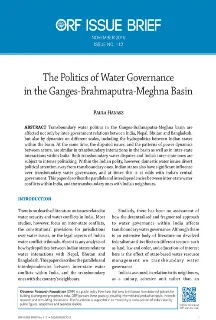India is assumed, in relation to its neighbours, as a unitary, cohesive unit rather than an aggregate of states, ministries, and interests that compete and sometimes conflict with each other. Taking a constructivist view of India’s water governance, i.e., one that accounts for these complexities, contradictions and conflicts in water governance networks, allows for a more nuanced understanding of the transboundary water interactions between India and its coriparians. This, in turn, allows for the exploration of a more flexible and appropriate transboundary water policy.
This article examines state-level political dynamics that affect the water interactions that India has with Nepal, Bhutan and Bangladesh.The purpose of this analysis is to provide insights into an overlooked aspect of regional hydropolitics that may be of relevance to Indian hydrocrats as well as international organisations engaged in water resource policy-making in the region (e.g., the World Bank-led South Asia Water Initiative). Relations with Pakistan over the rivers of the Indus basin are outside the scope of this paper as the political relationship between India and Pakistan is highly securitised and their water interactions are largely governed by one international agreement, the Indus Waters Treaty.
The views expressed above belong to the author(s). ORF research and analyses now available on Telegram! Click here to access our curated content — blogs, longforms and interviews.

 PDF Download
PDF Download



 PREV
PREV

